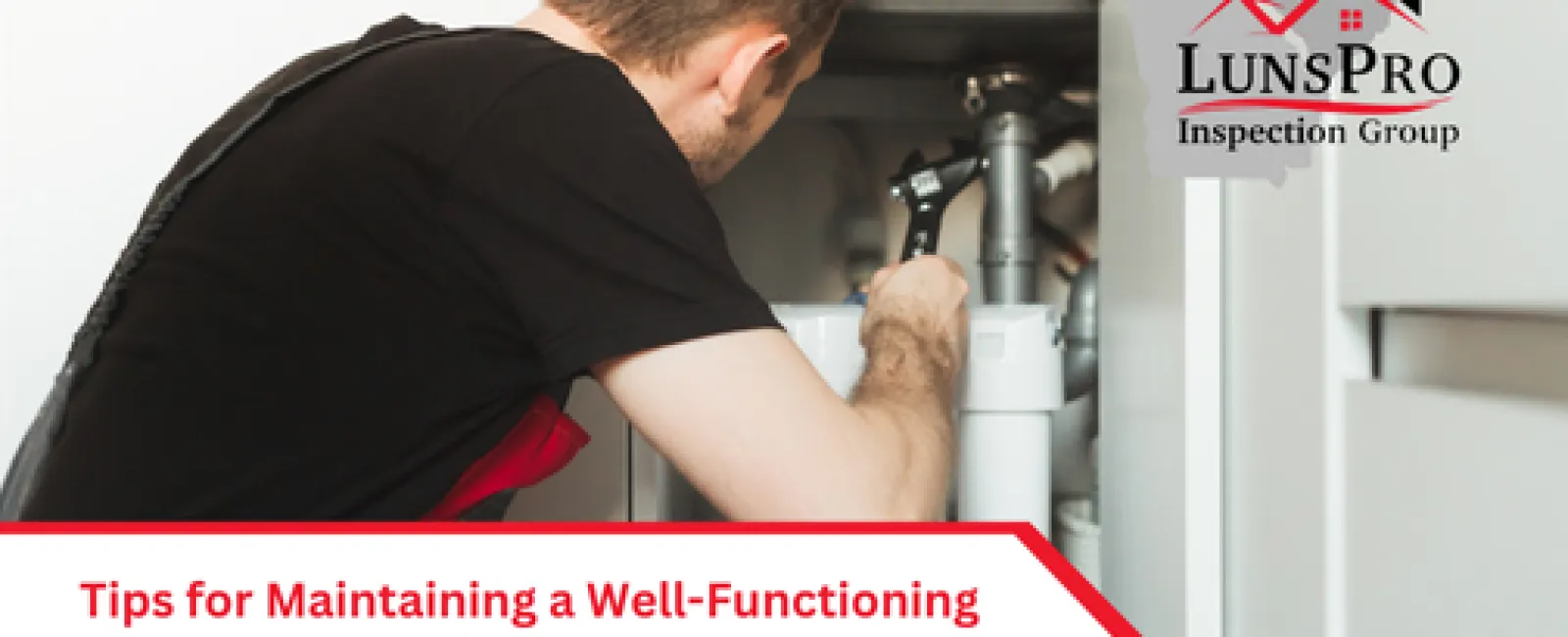Water softeners play a crucial role in many homes, particularly in areas where hard water is a persistent issue. By removing minerals like calcium and magnesium, these systems protect plumbing, extend the lifespan of appliances, and improve water quality. However, like any home system, water softeners require regular maintenance to function effectively. At LunsPro Inspection Group, we emphasize the importance of understanding and caring for your water softener as part of comprehensive home maintenance. Whether you're a homeowner or manage a commercial property, these tips will help you keep your water softener system running smoothly.
Why Maintaining Your Water Softener Matters
A water softener's job is to filter out hard water minerals, preventing scale buildup and ensuring water is gentle on pipes, appliances, and skin. Poorly maintained systems can lead to issues such as:
- Reduced efficiency in softening water.
- Increased energy bills due to hard water damage in appliances.
- Shortened lifespan of the water softener unit itself.
Regular maintenance ensures that your water softener performs optimally, helping you avoid costly repairs or replacements. Homeowners in the Carolinas who rely on hard water treatment systems can benefit greatly from incorporating maintenance checks into their routines. Our Carolina residential and commercial home inspections, including home inspections and well inspections, can identify problems early and provide actionable recommendations.
Key Components of a Water Softener System
To effectively maintain your system, it's essential to understand its main components:
- Resin Tank: Contains resin beads that attract and trap hard water minerals.
- Brine Tank: Holds salt or potassium chloride, which regenerates the resin beads.
- Control Valve: Regulates the flow of water and initiates regeneration cycles.
- Bypass Valve: Allows you to divert water away from the softener for repairs or maintenance.
By familiarizing yourself with these parts, you'll be better equipped to troubleshoot and care for your system.
Tips for Maintaining Your Water Softener System
1. Monitor Salt Levels Regularly
The brine tank relies on salt to regenerate the resin beads that remove hard water minerals. Check the salt levels every 4-6 weeks and refill as needed. Use high-quality salt pellets to minimize the accumulation of debris or impurities in the tank.
Pro Tip: Avoid letting the salt drop below the halfway mark, as this can reduce the efficiency of the regeneration process.
2. Clean the Brine Tank Periodically
Over time, the brine tank can accumulate dirt, sludge, or a crusty buildup known as a "salt bridge." Cleaning the tank every 1-2 years helps maintain its functionality.
Steps to Clean the Brine Tank:
- Turn off the water softener and disconnect it from the water supply.
- Empty the tank and remove any remaining salt.
- Scrub the interior with a mixture of water and dish soap.
- Rinse thoroughly and refill with fresh salt before reconnecting the system.
3. Inspect for Salt Bridges
Salt bridges occur when hardened salt forms a crust in the brine tank, preventing water from reaching the salt below. This disrupts the regeneration process.
How to Break a Salt Bridge:
- Gently poke the crust with a broom handle or similar tool to break it apart.
- Avoid using excessive force, which could damage the tank.
4. Flush the Resin Tank
The resin tank can accumulate iron, sediment, or other impurities over time. Flushing the tank with a specialized resin cleaner helps maintain its efficiency.
Steps to Clean the Resin Tank:
- Add the resin cleaner to the brine tank according to the manufacturer's instructions.
- Initiate a manual regeneration cycle through the control valve.
LunsPro Inspection Group recommends consulting a professional during home inspections and well inspections to ensure the resin tank is functioning correctly.
5. Check the Water Softener Settings
Your water softener's settings should align with the hardness level of your water and household water usage. Use a water hardness test kit to measure your water's mineral content and adjust the settings accordingly.
6. Inspect the Control Valve
The control valve regulates the regeneration cycle and overall functionality of the water softener. Periodically check the valve for signs of wear, leaks, or debris buildup. Cleaning or replacing parts as needed will keep the system running efficiently.
7. Replace the Resin Beads When Necessary
Resin beads can lose their effectiveness over time, typically lasting 10-15 years. If your water softener isn't removing hardness as effectively as before, it may be time to replace the resin.
8. Address Iron and Sediment Issues
In areas with high iron content, rust or sediment can clog the resin tank and reduce efficiency. Consider installing a pre-filter to capture these particles before they reach the water softener.
9. Schedule Professional Maintenance
While many maintenance tasks can be handled by homeowners, scheduling regular inspections by professionals, such as LunsPro Inspection Group, ensures your water softener operates at peak performance. Our Carolina residential and commercial home inspections provide a thorough assessment of water treatment systems, including softeners and wells.
Common Signs Your Water Softener Needs Maintenance
Even with regular upkeep, your water softener may develop issues over time. Watch for these warning signs that maintenance is overdue:
- Hard Water Symptoms: Scale buildup, spots on dishes, or dry skin and hair.
- Low Water Pressure: Indicates possible clogging in the resin tank or pipes.
- Odd Tastes or Odors: Suggests contamination or improper filtration.
- Increased Salt Usage: Could indicate inefficiency or leaks in the brine tank.
- Error Codes on Control Valve: Modern systems may display error messages when issues arise.
If you notice any of these signs, contact a professional for troubleshooting and repairs. Home inspections and well inspections are an excellent opportunity to address these concerns comprehensively.
Benefits of a Well-Maintained Water Softener
Maintaining your water softener offers numerous advantages, including:
- Extended Appliance Lifespan: Protects water heaters, dishwashers, and washing machines from hard water damage.
- Improved Water Quality: Ensures consistently soft, clean water for drinking, bathing, and cleaning.
- Lower Utility Bills: Reduces energy consumption by preventing scale buildup in pipes and appliances.
- Enhanced Home Value: A well-functioning water softener adds value to your property, especially in areas with hard water.
How LunsPro Inspection Group Can Assist
At LunsPro Inspection Group, we understand the importance of maintaining water treatment systems as part of a safe and functional home. Our Carolina residential and commercial home inspections are designed to identify issues with water softeners, wells, and plumbing systems.
Our Services Include:
- Water Quality Testing: Ensures your system is filtering contaminants effectively.
- System Efficiency Evaluations: Identifies areas for improvement or repair.
- Tailored Maintenance Recommendations: Provides actionable advice for extending the lifespan of your system.
A well-maintained water softener is a vital component of a healthy and efficient home. By performing regular maintenance tasks, monitoring for issues, and scheduling professional inspections, you can enjoy the benefits of soft, clean water while protecting your home's plumbing and appliances. Neglecting maintenance, on the other hand, can lead to inefficiencies, costly repairs, and decreased water quality.
At LunsPro Inspection Group, we specialize in home inspections and well inspections that go beyond the surface to address critical systems like water softeners. Our Carolina residential and commercial home inspections are tailored to identify potential problems and provide solutions that fit your needs.
If you're unsure about the state of your water softener or need professional guidance, contact us today. Together, we can ensure your system remains a reliable asset for years to come.

